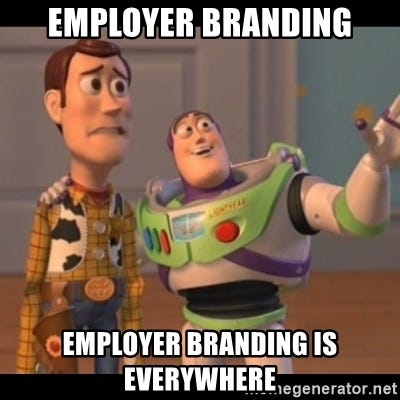The Great Resignation
Yes, yet another post about this.
Hello to the 82 new FullStack HR readers! If you haven’t yet subscribed - join the 700+ like-minded people by hitting the subscribe button.
Eva used to think she had one of the best jobs in the world. Working as a designer, she also thought she'd never be out of a job. When the COVID-19 pandemic struck, she felt confident her employer would ride the storm out. And sure, they managed pretty well, keeping afloat during the hard times. But that was pretty much it. They had to lay some people off, and the way they did it wasn't elegant. Eva kept asking her boss what the outlook was for working remote permanently was. Still, he just dodged the question until one day he came back saying the company decided that everyone needs to be in the office at least a couple of days a week.
Eva quit.
Ok, I made Eva up. But the story isn't unique. It's one we are seeing again and again. It's happening, and on such a scale that it's been dubbed The Great Resignation. You've probably seen the headlines already, but what are the ins and outs of this Great Resignation?
Let's take a closer look.
Is the great resignation even a real thing?
In a recent Microsoft survey, 41% of the 30 000 surveyed workers said they are considering quitting their job. The HR Software company Personio validated that number; in their study, 38% said they planned to leave their job within the next 6 to 12 months.
75% also said they would be open to talking to a recruiter about another job right now.
From April to July, over 14 million people said "Enough of this," and quit their jobs in the US. The country has never seen this massive resignation ever before.
Anecdotally, both from my own experience and from my colleagues who talk to many candidates every day, there are also indicators that people are inclined to at least take a call from a recruiter. Worth keeping in mind is that we're not talking about people laid off during the pandemic; we're talking about high-in-demand labor. (Also kudos and a shout-out to my colleagues Annahita, Molly, Adam, David, Julia, and Sofie for helping me twist and turn this topic.)
People are even willing to take on debt and leave one job without having a new one.
Ok, we probably don't need more data points here - the Great Resignation is a thing, and it's real. But what's driving it?
Ok, so why do people leave their jobs?
There've been a lot of reasons mentioned as the driving forces behind The Great Resignation.
The most commonly mentioned reason is that people were mistreated during the pandemic. It's said that a person's true character is often revealed in times of crisis. The same can be said about organizations, and when organizations threw their fancy employer branding buzzwords out the window, employees noticed. And when the outlook started to look slightly better, people started voting with their feet. This theory is backed up by a (to be peer-reviewed) study conducted at Stanford. Unsurprisingly, it shows that if an organization seemed to use the pandemic as an excuse to lay people off, the people that "survived" were more inclined to leave. Not really rocket science; still, the companies in the study are some of the largest in the world. So much for all of those talent management and employer branding efforts.
The leap is, of course, easier to do now; when we were in the early stages of the pandemic, there were a lot of uncertainties; people sat tight and hoped for the best. In those times, people rarely shifted jobs, creating a wave of people who probably would have left but waited.
In several studies and articles, a worse work-life balance is mentioned as the top reason people leave. A clear majority of people have enjoyed the freedom to work remotely. When companies now start to go back to normal and "force" people into the office two or more days a week, people aren't super keen on going back. Especially if the company they work for doesn't have a clear and consistent reason for pulling their people back.
We've seen this in backlashes around the "return to the office" from high-profile companies such as Google. First, they wanted people to return, and said that remote work would only be allowed for a minor part of their workforce. Then they did a 180-degree turn and said people were allowed to work remotely. But they might need to take a pay cut.
My guess is that people at Google were not overly enthusiastic about having to return to the office. Hence they reverted the decision.
An old HR saying is that people don't leave companies; they leave their bosses. I'm not sure that's valid in this case. Most likely, there are a lot of contributing and conjuring factors that fuel the shift.
Is it really the great resignation?
You've read up to here, and now I drop this? Really? Hear me out.
I know this makes great headlines. But I also think it's wrong. Because it implies that people are resigning and then doing nothing. That's not true. People are quitting, but they are also finding new jobs. Perhaps "The great job shift" would be a better title. But that probably wouldn't sell any papers or get any clicks.
People are still working; they are just not working for you anymore.
How to get people to stick around?
Don't be a jerk. Seriously.
If you publicly said stuff like "Our most important asset is our people," and then you immediately started to lay people off when the pandemic hit, just to protect your bottom line. Well, you now have a slight uphill to crawl.
I fully understand that some companies and organizations had to lay people off to protect their companies, but that's not what I'm referring to here. I'm referring to the companies and organizations that laid people off to make sure they made an extra dime or, even worse, that the executive team got their bonuses.
If you are in an organization that did this, now's the time to work hard on restoring trust with both existing and future employees. And that will probably be hard, but not impossible.
If you are an HR person in one of these companies and want to get your grumpy CEO on board the train on working having fewer people leave?
Showcase what impact an even more significant turnover will have for your CEO. What have you spent on recruitment the last year? Will that number go up or down if the current attrition trend continues? Dive into these numbers and use them as a base with your executive team. Once they have an overview, point out an alternative version where they stop being jerks (ok, maybe don’t call them that) and invest in their people instead.
As pointed out in last week's edition, I'm also a very firm believer in daring to show transparency and providing clarity. I assume a lot of the rumblings in organizations right now stem from a general uncertainty. Will we be remote or not? How will that work? What will happen to my team? When will I see them? Where are we now heading as an organization?
If you can provide clarity and a direction around these areas, I would say you are better off.
The emergence of outstanding leadership.
Ok, this is perhaps more of a hope of mine. Even though there's some data to back this up. I'm hoping we will see an emerging trend of companies doubling down on creating and fostering great leaders as one of the main differentiators between companies.
FastCompany killed "The era of wacky office perks" in an article this summer, and to that, I say - about time and amen!
"/.../today's young workers care primarily about how they are treated by their managers."
In all honesty, I think this stretches beyond "young workers". We put too little emphasis on fostering and developing great leaders within organizations. Why? Because it's easier to fill the fridge with RedBull than tell Bob he needs to be more empathic.
But if you want to combat the great resignation - return the fridge and start talking to your leaders.





